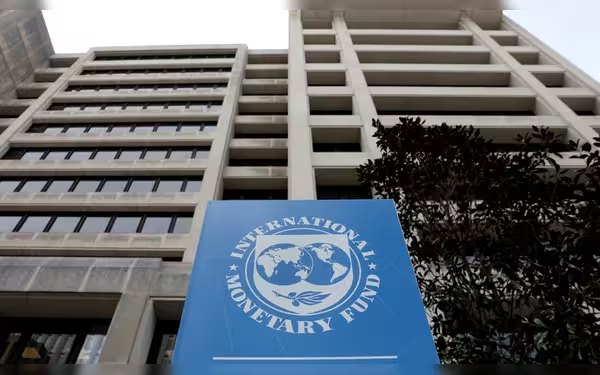Saturday, November 16, 2024 08:42 PM
IMF Announces $1.2 Billion Annual Reduction in Member Borrowing Costs
- IMF reduces borrowing costs by $1.2 billion annually.
- Surcharges for member countries decrease from 20 to 13.
- Argentina to save over $3 billion from new measures.
 Image Credits: arabnewspk
Image Credits: arabnewspkIMF announces measures to lower borrowing costs by $1.2 billion annually, benefiting member countries amid rising global interest rates.
In a significant move aimed at easing the financial burden on its member countries, the International Monetary Fund (IMF) has announced measures that will reduce borrowing costs by approximately $1.2 billion annually. This decision, revealed by the IMF's Managing Director Kristalina Georgieva, marks a pivotal shift in the organization's approach to lending, especially in light of the rising global interest rates that have made borrowing increasingly expensive for many nations.
Georgieva stated, "The approved measures will lower IMF borrowing costs for members by 36 percent, or about $1.2 billion annually." This reduction is expected to benefit a number of countries, with the anticipated number of nations subject to surcharges decreasing from 20 to 13 by the fiscal year 2026. This change comes as the IMF undertakes its first review of its policy on charges and surcharges since 2016, a necessary step given the current economic climate.
The IMF typically imposes regular interest rates along with surcharges for loans that exceed certain thresholds or durations, as well as commitment fees for precautionary arrangements. However, the recent announcement indicates that the charge above the fund's interest rate will be lowered, while the thresholds for both the amount and duration of loans will be raised. Additionally, the threshold for commitment fees will also increase. Georgieva emphasized, "While substantially lowered, charges and surcharges remain an essential part of the IMF’s cooperative lending and risk management framework, where all members contribute and all can benefit from support when needed." This statement underscores the importance of maintaining a balance between providing financial assistance and ensuring that all member countries contribute to the fund's sustainability.
The changes are set to take effect on November 1, and they come at a crucial time for many countries facing economic challenges. Notably, the five countries currently paying the highest surcharges include Ukraine, Egypt, Argentina, Ecuador, and Pakistan, as highlighted by research from Boston University’s Global Development Policy Center. Argentina, which is the IMF’s largest debtor, stands to save over $3 billion as a result of these changes, according to Finance Secretary Pablo Quirno.
Despite the positive implications of this announcement, it is important to note that the measures fall short of the demands made by various academics, non-profit organizations, and economists who have called for a complete cancellation of IMF surcharges. These critics argue that such surcharges impose additional burdens on countries already grappling with severe economic difficulties, thereby undermining the intended benefits of IMF lending.
While the IMF's decision to lower borrowing costs is a step in the right direction, it is essential for the organization to continue evaluating its policies to ensure that they effectively support member countries in their times of need. As global economic conditions remain uncertain, the focus should be on creating a more equitable financial environment that allows all nations to thrive without the weight of excessive debt.













